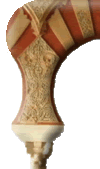

 Muslims Contribution to Sciences
Muslims Contribution to SciencesThese Muslims whose multi-disciplinary contributions sparked the flame of learning and productivity. Without whom the European Renaissance would not have begun and come to maturity. The basic understanding of sciences, mathematics, medicine, technology, sociology, and philosophy are being used by the West without giving rightful credit to them. This subject has largely been left to few obscure intellectual discourses on world history and human development. It is rarely mentioned in formal education, and if at all mentioned, their names are Latinized or changed with the effect of obscuring their identity and origin, and their association with the Islamic Civilization.
The Muslims contribution to humanity and Islamic Civilization is huge. This interactive Flash Movie below lists the names and contributions of the leading Muslims.
Place your mouse pointer on figures to view them
Names, Arabic & (Latin) |
Contributions |
Dates (CE) |
Jabir Ibn Haiyan (Geber) |
Father of Chemistry |
Died 803 |
Al-Asmai |
Zoology, Botany, Animal Husbandry |
740 - 828 |
Al-Khwarizmi (Algorizm) |
Mathematics, Decimal system, Astronomy, Geography. (Algorithm, Algebra, calculus) |
770 - 840 |
Amr ibn Bahr Al-Jahiz |
Zoology, Arabic Grammar, Rhetoric, Lexicography |
776 - 868 |
Ibn Ishaq Al-Kindi (Alkindus) |
Philosophy, Physics, Optics, Medicine, Mathematics, Metallurgy |
800 - 873 |
Thabit Ibn Qurrah (Thebit) |
Astronomy, Mechanics, Geometry, Anatomy |
836 - 901 |
Abbas Ibn Firnas |
Mechanics of Flight, Planetarium, Artificial Crystals |
Died 888 |
Ali Ibn Rabban Al-Tabari |
Medicine, Mathematics, Caligraphy, Literature |
838 - 870 |
Al-Battani (Albategnius) |
Astronomy, mathematics, Trigonometry |
858 - 929 |
Al -Farghani (Al-Fraganus) |
Astronomy, Civil Engineering |
860 |
Al-Razi (Rhazes) |
Medicine, Ophthalmology, Smallpox, Chemistry, Astronomy |
864 - 930 |
Al-Farabi (Al-Pharabius) |
Sociology, Logic, Philosophy, Political Science, Music |
870 - 950 |
Abul Hasan Ali Al-Masu'di |
Geography, History |
Died 957 |
Al-Sufi (Azophi) |
Astronomy |
903 - 986 |
Abu Al-Qasim Al-Zahravi (Albucasis) |
Surgery, Medicine. (Father of Modern Surgery) |
936 - 1013 |
Muhammad Al-Buzjani |
Mathematics, Astronomy, Geometry, Trigonometry |
940 - 997 |
Ibn Al-Haitham (Alhazen) |
Physics, Optics, Mathematics |
965 - 1040 |
Al-Mawardi (Alboacen) |
Political Science, Sociology, Jurisprudence, Ethics |
972 - 1058 |
Abu Raihan Al-Biruni |
Astronomy, Mathematics. (Determined Earth's Circumference) |
973-1048 |
Ibn Sina (Avicenna) |
Medicine, Philosophy, Mathematics, Astronomy |
981 - 1037 |
Al-Zarqali (Arzachel) |
Astronomy (Invented Astrolabe) |
1028-1087 |
Omar Al-Khayyam |
Mathematics, Poetry |
1044-1123 |
Al-Ghazali (Algazel) |
Sociology, Theology, Philosophy |
110 -1111 |
Abu Bakr Muhammad Ibn Yahya (Ibn Bajjah) |
Philosophy, Medicine, Mathematics, Astronomy |
1110-1138 |
Ibn Zuhr (Avenzoar) |
Surgery, Medicine |
1091-1161 |
Al-Idrisi (Dreses) |
Geography (World Map, First Globe) |
1099-1166 |
Ibn Tufayl, Abdubacer |
Philosophy, Medicine, Poetry |
1110-1185 |
Ibn Rushd (Averroes) |
Philosophy, Law, Medicine, Astronomy, Theology |
1128-1198 |
Al-Bitruji (Alpetragius) |
Astronomy |
Died 1204 |
Ibn Al-Baitar |
Pharmacy, Botany |
Died 1248 |
Nasir Al-Din Al-Tusi |
Astronomy, Non-Euclidean Geometry |
1201-1274 |
Jalal Al-Din Rumi |
Sociology |
1120-1273 |
Ibn Al-Nafis Damishqui |
Anatomy |
1213-1288 |
Al-Fida (Abdulfeda) |
Astronomy, Geography, Histrory |
1273-1331 |
Muhammad Ibn Abdullah (Ibn Battuta) |
World Traveler, Sociology, 75,000 mile voyage from Spain to China and back |
1304-1369 |
Abdur-Rahman Ibn Khaldun |
Sociology, Philosophy of History, Political Science |
1332-1395 |
Earliest extensive naval expeditions in world History. China to Africa |
1371-1435 |
|
Ulugh Beg |
Astronomy |
1393-1449 |
Hazarfen Ahmet Celebi |
took off from Galata tower and flew over the Bosphorus |
1700 |
Logari Hasan Celebi |
first manned rocket into upper atmosphere, using 300 pounds of gunpowder as the firing fuel. |
1750 |
Tipu, Sultan of Mysore |
innovator of the world's first war rocket. Two of his rockets, captured by the British at Srirangapatana, are displayed in the Woolwich Museum Artillery in London. The rocket motor casing was made of steel with multiple nozzles. The rocket, 50mm in diameter and 250mm long, had a range performance of 900 meters to 1.5 km. |
1783-1799 |